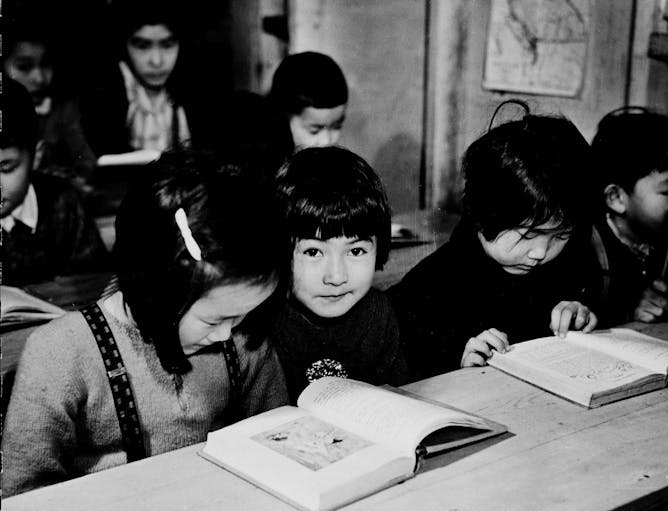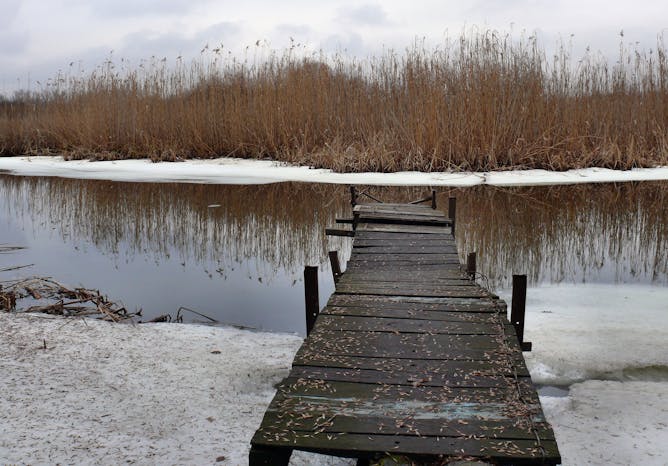|
Since our launch five months ago, we’ve probably written about the topic of opioids more than any other public health issue. Today in The Conversation Canada, Dr. Tola Afolabi, a plastic surgeon and reconstructive surgeon who is currently a Munk Global Journalism Fellow at the University of Toronto, writes about the opioid crisis from a perspective she knows very well. Dr. Afolabi notes surgeons are the third-biggest prescribers of opioids. “One study estimates that every year in the United States, more than two million patients become addicted to the opioids that their surgeons prescribed,” she writes. Yet Dr. Afolabi notes there are no guidelines for surgeons when prescribing opioid painkillers.
One of the darkest moments in Canada’s history happened in the 1940s when thousands of Canadians of Japanese heritage were placed in internment camps during the Second World War. Jordan Stanger-Ross, an associate professor at the University of Victoria’s Centre for Asia Pacific Initiatives, has a fascinating article about 300 letters from Japanese Canadians written during a time when these citizens had their property seized and sold off.
Donald Trump’s travel ban has faded from the headlines as the U.S. president disrupts the news cycle on a daily basis, but Raymond B. Chiu of Western University has written both a personal and academic article about why he and others who believe in religious diversity are boycotting conference travel to the United States.
And finally, I love turtles…the real ones, not those chocolates that people offer up at Christmas time. But I don’t love them as much as Jacqueline Litzgus of Laurentian University. Prof. Litzgus wrote a great article a couple of weeks ago about the illegal turtle trade and today she returns with an answer to a question I’ve always wondered: How do turtles in Canada survive the winter? Answer: they breathe through their butts! If that doesn't get you to read the article, I don't know what will.
|

At present, surgeons vary widely in their approach to opioid prescription and some patients use opioids for prolonged periods post-surgery.
(Shutterstock)
Tola Afolabi, University of Toronto
Surgeons are big prescribers of opioids. But while guidelines are in place for dentists and for doctors who prescribe opioid-based painkillers for long-term pain, there are none for surgeons.
|

Loyalty to the British Empire is taught to these second and third generation Japanese children in an Internment Camp in British Columbia circa 1942.
(CP PHOTO/Jack Long National Archives of Canada C-067492)
Jordan Stanger-Ross, University of Victoria
Recently, 300 protest letters written by Japanese Canadians in the 1940s were reopened. The letters convey a deep sense of loss, injustice and outrage by Japanese Canadians who lost their homes.
|

People carry posters during this Feb. 2017 rally against President Donald Trump’s executive order banning travel from seven Muslim-majority nations, in New York’s Times Square.
(AP Photo/Andres Kudacki, File)
Raymond B. Chiu, Western University
In the shadow of Trump-era cross-border discrimination, an early-stage scholar reflects on the meaning of religious diversity and his act of resistance by boycotting conference travel to the U.S.
|

Turtles can’t head south for the winter, so they hibernate in rivers, lakes and ponds.
(Pexels)
Jacqueline Litzgus, Laurentian University
Crisp temperatures, ice-capped ponds and frozen landscapes send animals scurrying for cover. But just what do turtles do when winter takes hold?
|
Politics
|
-
Enock C. Mudzamiri, University of South Africa
Contrary to popular sentiment that the coup in Zimbabwe would usher in a new era of democracy, the military intervention is much more about a succession crisis in the ruling Zanu-PF.
|
|
Health + Medicine
|
-
Sasha Handley, University of Manchester
It is worth remembering that sleep 'crises' are far from new.
|
|
Business + Economy
|
-
David Choffnes, Northeastern University
How do internet companies decide which network traffic to slow down and which to charge against users' data plans? And what can we learn about net neutrality from the answers?
|
|